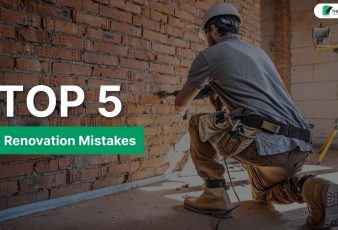When the housing market is slow and signs of imminent acceleration are scarce, homeowners plan to extend their residential properties instead. It seems a better idea and rather effective to save time and money. Still, before you plunge into the buying process and get deep with a house extension, there’re things worth considering.
1. Budget
Perhaps the most important and first thing to ask yourself is the budget limit. Before calling in the architect and work on the extension blueprint, think carefully from all aspects, brainstorm and come up with a good idea.
Calculate how much you need spending and do count extras as architect’s service fees and planning application cost (if any). Most builders and architects will also quote over a net of VAT so add an extra 20 percent to be on the safe side.
Upon determining the budget, stick to it but do remember that costs easily climb if you’ve extension plans for residential properties.
2. Aim of the extension
The primary reason for overall extension matters a lot and must be valid enough to satisfy builders associations in your area or country. Some common reasons are additional rooms for children, a newly born, initiating a home office or a living area where the whole family can sit comfortably and enjoy peaceful moments. Things or particular features you want to see with the extension, types of alterations all are important and worth considering.
3. Total timeframe
Extension with residential properties isn’t an overnight game! Getting approval on planning and building regulations take months sometimes so you’ve to be patient, expect upheaval and interruption to the usual routine for the betterment.
Time of the year and factors such as imminent family events, holidays and so on are important having a significant impact on overall restructuring process. Once taking the decision, plan ahead as far as possible which is a professional approach.
4. Planning permission
A few real estate alterations especially in addition to single-story, loft conversion or perhaps introducing a sunroom, planning permission mightn’t be needed. However, planning regulations and requirements vary per state and even among different communities so do check yours to proceed definitely. Your immediate architect and local planning officer are ought to guide you best so do approach them.
5. Need of an architect
Full-scale residential properties do require veteran architects with extension, however; smaller ones may be done solo but not always. There’re been many cases when even careful DIY tasks went awry resulting in extra investment and time. For achievable plans and conceivable applications, the only solution is to approach expert architects and other consultants like structural engineers. Don’t forget to include the entire amount in your extension budget!
6. Impact on the neighbours
If you’re amending your own property that’s bordered with other homes just like in community development, it’ll eventually impact the neighbors. So it’s utterly important to take your neighbours in confidence, share the expansion plan and prepare them for what’s to come. You don’t want to end up quarrelling or having a life-long grudge with the next door fellows or worse, raise legal concerns.
7. Conservation area
In case your home is a listed building or designated in a conservation area, strict laws are likely to hold you back from any alterations. You may be unaware if it’s actually a conservation area so check with the local council or ask the architect to avoid any legal entanglements.
8. Direction of the restructure
Once the basics are all settled, decide where you actually wish to incorporate the extension. Loft conversions are gaining momentum so if you have a choice to alter the attic into a new room without showing off external signs, it’s definitely worth noting.
Before concluding I’d like to mention Banke’s apartments for sale in downtown Dubai department for handing over such useful information on this amazing topic. In the end, the above approach is to minimise the pessimistic impact of property extension and make it less hectic.
Read More:




























